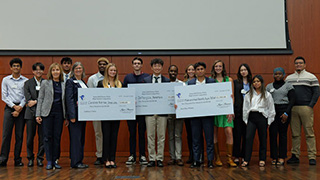Seton Hall University Hosts Prestigious Fulbright Scholar for Timely Lecture Series on AI and Digital Innovation
Wednesday, September 11, 2024

Fulbright Scholar Giovanni Schiuma
In an exciting new collaboration, the Division of Continuing Education & Professional Development and Stillman School of Business at Seton Hall University are proud to introduce a 5-part lecture series, “Shaping Digital Futures: Innovation at the Intersection of Art, AI, and Transformation.” This cutting-edge series is led by renowned Professor Giovanni Schiuma, a visiting Fulbright scholar from LUM University and an expert in the fields of technology, innovation and organizational transformation.
This partnership represents a milestone for Seton Hall, highlighting its growing global research profile and dedication to forward-thinking approaches that blend technology and humanistic values. The series will cover topics ranging from the integration of artificial intelligence in leadership to the arts as a tool for organizational transformation, bringing together diverse perspectives on the evolving role of technology in business and society.
Professor Schiuma, who brings a wealth of expertise to the series, emphasized the significance of Seton Hall as the host institution for Fulbright scholars and for this research series. “Seton Hall University’s strong emphasis on technology and research, combined with its humanistic perspective and expanding global research profile, make it an ideal partner for this program. The University’s focus on the human side of technological advancement—incorporating ethics, sustainable development, and the value of human potential—demonstrates a thoughtful approach to balancing the equation of technological innovation with the calculation of risks, making it a perfect environment for scholarly inquiry for my Fulbright experience as well as deep and meaningful discussions on the future of digital transformation.”
The series promises to offer insightful dialogue and practical strategies for leveraging technology while upholding human values, making it a must-attend event for industry professionals, academics and students alike.
Provost and Senior Executive Vice President Katia Passerini shared that "Hosting the Fulbright Lecture Series with Giovanni Schiuma at Seton Hall is a pivotal opportunity to enhance our global reputation, building on the University’s strong connections with Italy and the Vatican. This partnership not only strengthens our academic excellence but also positions Seton Hall as a leading institution for international scholarly exchange in fields like STEM, technology and business, alongside the liberal arts."
See below for specific details and registration links for each of the sessions:
The first part of the series, “Company Stakeholders Value Creation Mechanisms: Intangible and Technology Value Drivers” will be held at 6 p.m., Tuesday, September 17, 2024, in Schwartz Hall, Room 101.
The lecture will delve into how organizations can systematically create value by understanding and managing the intricate relationships between stakeholder needs, organizational competencies and knowledge-based assets. This lecture will equip participants with an understanding of how to strategically manage knowledge resources and technology to enhance organizational performance and stakeholder satisfaction, grounded in the theoretical and practical insights provided by the Knowledge Value Chain approach. The "Knowledge Value Chain" framework illustrates how organizations generate value for stakeholders through a structured approach that aligns strategic knowledge resources with organizational competencies, processes and performance.
The second part of the series, “Adapting to the New Normal: Post-Modern Management Approaches and Techno-Human Systems for Resilient Organizations” will be held at 3:30 p.m., Wednesday, October 9, 2024, in Jubilee Hall, Room 139.
The lecture will delve into how the business management landscape is changing in response to emerging global macro trends. Traditional management principles, which emphasize standardization, control and efficiency, are increasingly challenged by the need for adaptability, resilience and transformation due to rapid technological advancements, environmental changes and socio-economic disruptions. The lecture will focus on the evolving role of management in addressing contemporary global challenges and stress the importance for organizations to not only withstand disruptions but also to transform in ways that enable them to remain competitive and innovative in an ever-changing business environment. It argues that shifting towards new management paradigms is crucial in today's complex and rapidly changing business environment. For this reason, new management approaches, such as arts-based management, are vital for transformation. These paradigms also reflect the integration of human and technological systems to build organizations that can adapt and thrive in the face of disruptions, opening up new possibilities for innovation and growth.
The third part of the series, “Transformative Leadership in the Digital Age: Integrating AI with Human Potential for Organizational Transformation” will be held at 2 p.m., Wednesday, October 23, 2024, in Jubilee Hall, Room 141.
The lecture will delve into the crucial role of leadership in propelling organizational transformation by combining artificial intelligence (AI) with human capabilities. In today's rapidly changing business landscape, the success of organizations increasingly depends on their ability to blend state-of-the-art technologies with the unique strengths of human potential, thereby creating a truly techno-human organization. The lecture will define transformative leadership in the context of the digital age and its significance in empowering organizations to innovate and adapt continuously. It will also explore the synergies between AI technologies and human capabilities, underscoring the necessity of a balanced approach that harnesses both to maximize organizational potential. This will involve understanding AI’s role in enhancing decision-making, fostering creativity and driving innovation while maintaining the irreplaceable value of human judgment and empathy. The lecture will outline the essential competencies for transformative leaders to successfully bridge AI and human potential. These competencies include digital literacy, emotional intelligence, strategic vision, ethical judgment and cultivating a culture of continuous learning and adaptation. The "Transformative Leadership Compass" frames them, which summarizes these competencies, providing a framework that profiles these skills and enables leaders to steer their organizations through digital transformation.
The fourth part of the series, “The Arts as a Catalyst for Change: Exploring the Arts Value Map for Organizational Innovation and Transformation” will be held at 3:30 p.m., Wednesday, November 6, 2024, in Corrigan Hall, Room 62.
The lecture will explore how the arts can be harnessed as a potent catalyst for organizational transformation. Leaders are encouraged to explore the arts as a rich knowledge domain that offers innovative tools, frameworks and approaches in the quest for new management models aligned with post-modern paradigms. This lecture will highlight how the arts address the aesthetic dimensions of organizations, influencing both people and infrastructure development. By introducing the Arts Value Map, the lecture will demonstrate how organizations can strategically deploy the arts to create environments where AI, technology and human potential are seamlessly integrated. The session will explore practical strategies for leveraging the arts to foster creativity, enhance cultural sensitivity and drive continuous innovation, ultimately shaping a transformative organizational culture.
The final and fifth part of the series, “Beyond Sponsorship: Managing Arts-Based Initiatives for Driving Stakeholder Value through Creative Partnerships” will be held at 6 p.m., Tuesday, November 12, 2024, in Schwartz Hall, Room 101.
The lecture will focus on the practical application of the arts within organizational settings to drive development and create value for stakeholders. This lecture will explore how arts-based initiatives (ABIs) can be strategically implemented to enhance organizational growth by leveraging the aesthetic dimensions outlined in the Arts Value Map. It will discuss the management models necessary for defining and implementing ABIs, emphasizing the importance of fostering creative partnerships between arts-based organizations and traditional businesses. Moving beyond conventional sponsorship models, these partnerships can integrate creative approaches that align with strategic knowledge assets, driving meaningful value creation for all stakeholders involved.
Categories: Education, Research





